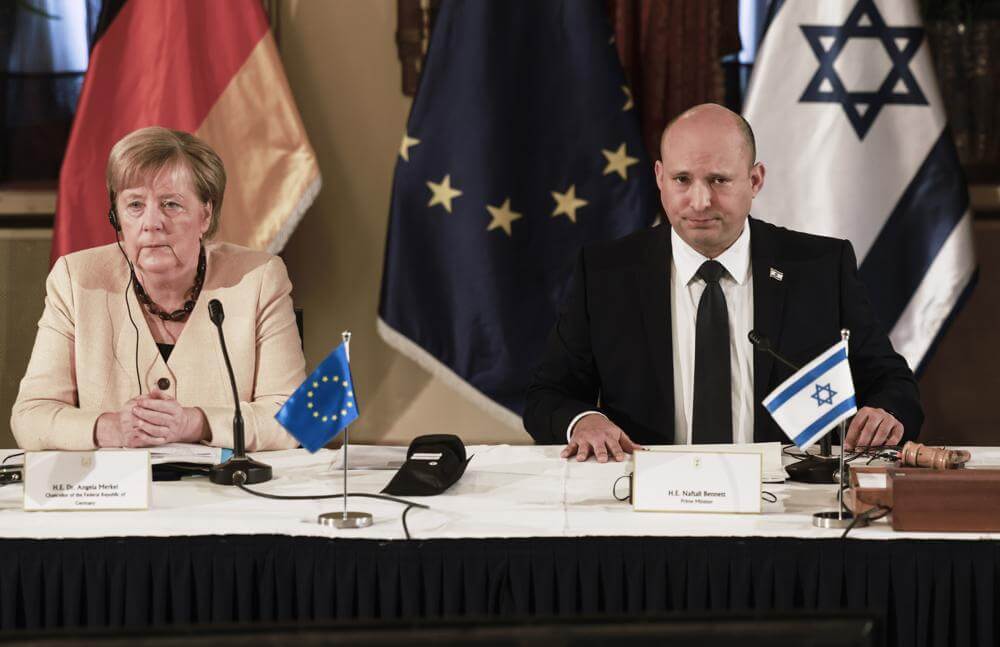Outgoing German Chancellor Angela Merkel arrived in Israel on Sunday for her final official trip to the country, where she met with Israeli Prime Minister (PM) Naftali Bennett and Israeli lawmakers and officials. During her visit, Merkel stressed the importance of reviving the nuclear deal with Iran and underscored Germany’s commitment to achieving a two-state solution to end the Israel-Palestine conflict.
At a joint press conference with Bennett in Jerusalem, Merkel stressed the importance of the 2015 nuclear deal, also known as the Joint Comprehensive Plan of Action (JCPOA), in delaying Iran’s path to a nuclear weapon. “I never considered the JCPOA to be ideal, but it’s better than having no agreement,” Merkel said.
PM Bennett: We are very pleased to host you here today, and I would like to convey to you the deep appreciation of the people of Israel for your standing by us over the years, in words, and more importantly – in actions. You are a great friend of Israel. Thank you our friend. pic.twitter.com/A0JAnLJqIn
— Prime Minister of Israel (@IsraeliPM) October 10, 2021
Furthermore, she noted that talks to revive the JCPOA are at a crucial stage right now, especially as Iran has been reluctant to enter into talks as well as enriching uranium to dangerous levels. Merkel added that Russian President Vladimir Putin and Chinese leader Xi Jinping had a responsibility to bring Iran back to the negotiating table. “I also see a responsibility for Russia and China here, since if the JCPOA is no longer doing what it’s meant to do then that’s very difficult, so we are now in very decisive weeks for this deal.”
However, Bennett said Iran seeks “genuine suffering” for Israel and its people, and that Tehran’s actions suggest that it have no intention of scaling back its nuclear programme. “There is no point in trying to appease the Iranians; they interpret conciliation as a weakness. They continue to thrive in the international community, playing for time while constantly advancing uranium enrichment and destabilizing the region,” he said.
The PM also noted that reviving the JCPOA will be an “acceptance of Iran becoming a nuclear threshold state” and this, he said, “will be a moral stain on the free world [and] threaten world peace.” In this respect, Bennett called on Merkel to support Israel, saying that Germany’s position on the nuclear deal is “particularly important.”
Merkel repeatedly stressed Germany’s commitment to Israel’s security and expressed confidence that the next German government would maintain this position. “I am optimistic that every German government, including the one that follows mine, will feel committed to Israel’s security,” she said.
Israel opposes any attempts to revive the 2015 nuclear deal and views Iran’s nuclear programme as an “existential threat” because Iranian authorities, including Supreme Leader Ayatollah Ali Khamenei, have called for the “annihilation” of the Jewish State.
The German Chancellor also said a two-state solution is the best way to end the decades-long Israel-Palestine conflict. “I think that on this point, even if at this stage it seems almost hopeless, the idea of a two-state solution should not be taken off the table, it should not be buried.” Noting that the Palestinians “should be able to live securely in a state,” Merkel called on Israel to scale back its settlement construction in the West Bank.
Bennett, however, disagreed with Merkel on the creation of a Palestinian state, saying that “a Palestinian state means that it is highly likely that a terror state will emerge seven minutes away from my own house.” However, Bennett said he is a “very pragmatic person,” and noted that under his leadership, Israel “undertaking a series of actions on the ground in order to make things easier for everyone,” including Israelis and Palestinians. “We are not ignoring the Palestinians,” said Bennett. “They are our neighbours. They’re not going anywhere; we’re not going anywhere.”
Apart from the meeting with the Israeli PM, Merkel also met with Israeli lawmakers and officials. In particular, she met with the women ministers of Israel 36th cabinet, the government with the most women ministers in Israel’s cabinet. Merkel also visited Israel’s Holocaust memorial, Yad Vashem, and said, “The crimes against the Jewish people documented here are an everlasting responsibility and reminder for us Germans.”
Furthermore, Merkel discussed the strengthening of Germany-Israel relations in various fields, including business, science, education, health, and security. She noted that it was a “great honour” to visit Israel at the end of her term and said her government had worked hard “to make the relationship between both our countries and peoples even stronger and broader.”

